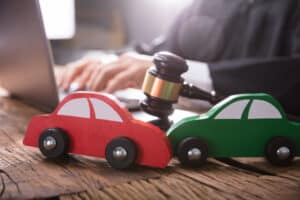Car accidents frequently occur when other drivers exhibit road rage, violate traffic laws, or drive in a distracted or intoxicated manner. If you suffered injuries in a car accident due to another driver's reckless behavior, you must consult a skilled car accident attorney in your jurisdiction as soon as possible. A Phoenix car accident lawyer will have the skills and experience necessary to effectively settle or litigate your case through the court system. Your lawyer can manage every step of the process for you while you focus on recovering from your injuries and getting better.
How Can a Car Accident Attorney Help?
A car accident lawyer plays a key role in handling personal injury claims and lawsuits following a crash and injuries. These professionals provide invaluable assistance to victims seeking compensation.
First, these legal professionals advocate for their clients, leveraging their experience to protect the injured party's rights throughout the process.
One crucial aspect of a car accident lawyer's role is gathering and evaluating evidence. They meticulously investigate the accident's circumstances, collecting police reports, witness statements, medical records, and any other pertinent information that can strengthen the client's case. This proactive approach helps build a compelling argument for liability and damages.

Effective communication with insurance companies is another key function of car accident lawyers. Insurance companies often aim to minimize payouts, and attorneys are a buffer between the victim and the insurers. Lawyers negotiate with insurance adjusters to secure fair settlements that cover medical expenses, property damage, lost income, and other damages incurred due to the accident.
In cases where negotiations fall short, car accident lawyers are prepared to escalate the matter to litigation. They draft and file the necessary legal documents, navigate court procedures, and present the case to a judge or jury. Their experience in personal injury law enables them to construct persuasive legal arguments that highlight the negligence or fault of the opposing party.
Additionally, car accident lawyers provide invaluable guidance on the potential value of a personal injury claim. They assess the extent of the victim's injuries, consider long-term medical costs, and evaluate the effects on the individual's quality of life. This comprehensive evaluation aids in determining an appropriate settlement amount or, if necessary, justifies the pursuit of a lawsuit for maximum compensation.
Furthermore, legal professionals assist in coordinating medical care and treatment. They often work closely with healthcare providers to ensure that clients receive the necessary medical attention while building solid documentation of the injuries sustained in the accident.
A car accident lawyer serves as a dedicated ally for individuals navigating the aftermath of a traumatic event. From evidence gathering to negotiation and potential litigation, these legal professionals work tirelessly to secure the best possible outcome for their clients, offering support and experience every step of the way.
Debilitating Injuries in a Car Accident
Victims of car accidents resulting from someone else's negligence can endure a spectrum of serious injuries, ranging from immediate trauma to long-term consequences. One of the most severe injuries is traumatic brain injury (TBI), which occurs when the head sustains a forceful impact. TBIs can lead to cognitive impairment, memory loss, and altered consciousness, profoundly affecting an individual's quality of life.
Spinal cord injuries (SCIs) are another devastating outcome. These injuries may result in paralysis, affecting mobility and independence. Depending on the location and severity of the spinal cord damage, victims may face a lifetime of physical challenges, necessitating adaptive technologies and significant lifestyle adjustments.
Orthopedic injuries, such as fractures and dislocations, are common in car accidents. High-impact collisions can cause bones to break, leading to prolonged recovery periods and potential long-term complications. Joint injuries, like damage to the knees or shoulders, may require surgical intervention and rehabilitation to regain functionality.
Soft tissue injuries, such as whiplash, are frequently associated with rear-end collisions. Whiplash can cause neck pain, stiffness, and headaches, often requiring extended periods of physical therapy for recovery. Additionally, internal injuries, including organ damage or internal bleeding, may not be immediately apparent but can pose serious threats to a victim's health.
Psychological trauma is another frequently overlooked result. Victims of car accidents may experience post-traumatic stress disorder (PTSD), anxiety, or depression due to the emotional toll of the incident. These mental health challenges can persist long after physical injuries have healed, affecting daily life, relationships, and overall well-being.
The financial burden resulting from medical bills, rehabilitation costs, and potential loss of income adds another layer of complexity to the aftermath of a car accident. Victims may face challenges in obtaining adequate compensation to cover these expenses, exacerbating the stress and hardship they endure.
Car accidents resulting from someone else's negligence can lead to a myriad of serious injuries, affecting victims physically, mentally, and financially. Seeking immediate medical attention, legal support, and comprehensive rehabilitation is crucial for mitigating the long-term consequences and facilitating the recovery process for those affected.
How Driver Negligence Causes Car Accidents
The negligence of other drivers is a significant factor contributing to car accidents, leading to a wide array of consequences on the roads. One primary form of negligence is distracted driving, where drivers divert their attention from the road. This can result from activities such as texting, talking on the phone, or adjusting in-car entertainment systems. Distractions compromise reaction times and awareness, significantly increasing the risk of collisions.

Another common form of negligence is reckless driving, including aggressive behavior, speeding, and disregarding traffic rules. Reckless drivers often engage in maneuvers that jeopardize safety, such as tailgating, weaving between lanes, or running red lights. Their actions escalate the potential for accidents and endanger both themselves and others on the road.
Failure to obey traffic signals and signs is yet another manifestation of negligence. Disregarding stop signs, running red lights, or failing to yield the right-of-way disrupts the flow of traffic and can lead to catastrophic collisions. Such violations are often rooted in a lack of attention, impatience, or a blatant disregard for the safety of oneself and others on the road.
Inadequate maintenance of vehicles is a less obvious but equally important factor in accidents due to negligence. Drivers who neglect regular maintenance, including brake checks, tire inspections, and fluid changes, increase the risk of mechanical failures on the road, potentially resulting in accidents that proper upkeep might have prevented.
Impaired driving, involving alcohol or drugs, is a grave form of negligence that impairs cognitive functions and coordination. Intoxicated drivers are more prone to making poor decisions and have diminished reaction times, significantly elevating the likelihood of accidents. Despite widespread awareness campaigns, impaired driving remains a persistent and dangerous issue.
Driver negligence is a pervasive and multifaceted issue contributing to car accidents. Whether through distracted driving, reckless behavior, disregard for traffic regulations, or impaired decision-making, the actions of negligent drivers compromise road safety. Efforts to mitigate these risks involve:
- Increased awareness.
- Stricter enforcement of traffic laws.
- Ongoing education to promote responsible and attentive driving behavior.
Types of Recoverable Damages Following a Car Crash
Victims of car accidents resulting from another driver's negligence may be entitled to damages to address the physical, emotional, and financial toll of the incident. These damages include the following:

- Medical Expenses — Compensation for medical expenses is a crucial component. This encompasses costs related to hospital stays, surgeries, medications, rehabilitation, and ongoing medical treatments. Car accident victims may receive reimbursement for all reasonable and necessary healthcare expenses incurred due to the other driver's negligence.
- Lost income — Lost income is another significant area for compensation. When injuries result in the inability to work, victims may be eligible to recover the income they should have earned during their recovery period. This includes current lost income and potential future earnings if the injuries lead to a diminished capacity to work.
- Loss of Earning Capacity — Loss of earning capacity is a distinct category considering the long-term repercussions on a victim's ability to earn a living. If the injuries result in a diminished ability to work or pursue certain occupations, victims may be eligible to pursue compensation for the impairment of their earning potential.
- Mental Distress — Mental distress or emotional anguish resulting from the car accident is also a valid basis for seeking damages. Compensation can address the pain, suffering, anxiety, and trauma experienced due to the negligent actions of another driver, acknowledging the intangible but real effects on a victim's overall well-being.
- Punitive Damages — In some cases, the accident victim may pursue punitive damages to punish the negligent driver for particularly egregious behavior and to deter others from engaging in similar actions. These damages go beyond compensating the victim and seek to send a strong message about the consequences of reckless or intentionally harmful conduct.
- Loss of Life Enjoyment — Loss of life enjoyment compensates victims for the negative repercussions of injuries on their ability to enjoy life's pleasures and activities they once cherished. Additionally, the spouse or family members may pursue damages for the loss of consortium, addressing the injuries' negative effects on relationships and companionship.
- Loss of Body Function — Loss of the ability to use a body part is a specific category addressing the impairment or loss of function in a particular body part due to the accident. Compensation addresses the physical limitations and lifestyle changes resulting from such injuries.
Victims of car accidents have the right to seek a range of damages, including compensation for medical expenses, lost income, loss of earning capacity, mental distress, punitive damages, loss of life enjoyment, loss of consortium, and loss of the ability to use a body part, as a way to rebuild their lives in the aftermath of another driver's negligence.
What Happens at a Car Accident Trial, and Who Decides the Case?
In a car accident trial, the courtroom becomes a “stage” where the intricacies of the collision unfold, with each party aggressively presenting their narrative. The core issues of liability and damages are the most important, and it is the duty of the judge and, in some cases, a jury, to untangle the web of events leading to the unfortunate incident.
The trial commences with the parties’ attorneys presenting their respective cases. Witnesses, often eyewitnesses or experts, testify under oath, recounting their version of events. Their testimonies serve as building blocks, shaping the perspectives of those who must render judgment.
Liability rests on establishing who bears responsibility for the accident. Attorneys scrutinize evidence, from accident reports to traffic camera footage, to construct an airtight argument. The primary goal of an accident victim’s lawyer is to establish that the at-fault driver deviated from the established standard of care, such as by violating one or more traffic laws, and caused the car accident.
As the trial unfolds, the determination of damages takes precedence. This involves not only physical injuries but also property damage, medical bills, and other related costs. The accident victim’s legal team meticulously outlines the financial toll of the collision, seeking compensation that aligns with the extent of their client's suffering.
The judge serves as the arbiter, applying the law to the facts presented. In cases where a jury is involved, their role is to weigh the evidence and deliver a verdict. Their decisions shape the outcome, deciding the fate of the liable party and the extent of damages the victim will receive.
An experienced car accident attorney in your jurisdiction can aggressively represent you during a jury trial and all other legal proceedings in your case in pursuit of the damages you deserve.
Speak with a Car Accident Lawyer About Your Legal Matter Today

If you suffered injuries in a car accident, an experienced car accident attorney can manage every step of the legal process for you. Specifically, your lawyer can pursue a claim with the appropriate insurance company and represent you during all settlement negotiations. Additionally, if litigation becomes necessary in your case, your lawyer can file a lawsuit and handle every step of litigation in the state court system.
Consultations with car accident attorneys are free, so you have nothing to lose by reaching out today. Instead of wondering what car accident lawyers can do to help, discuss a lawyers services with them directly.